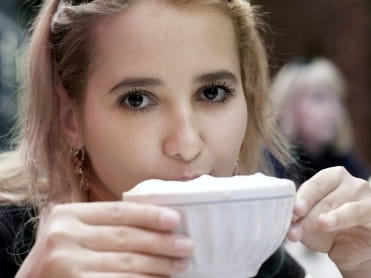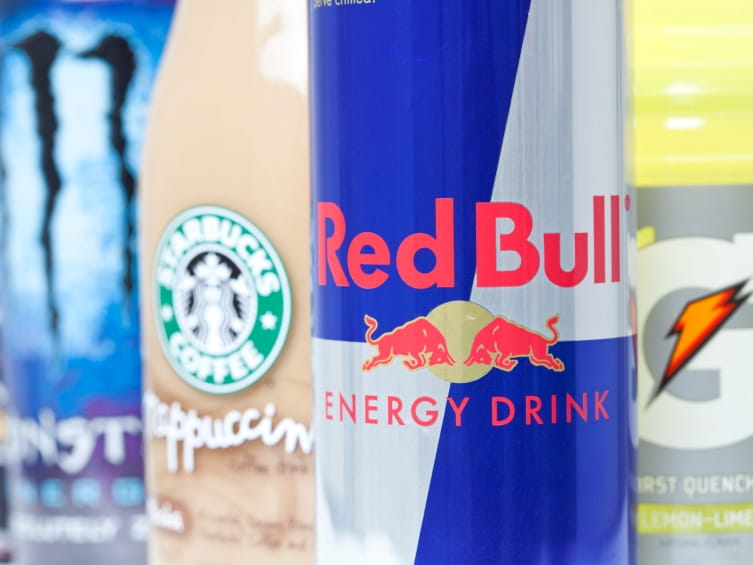How Much Caffeine is Safe?

The Bottom Line
Symptoms of caffeine overdose can be mild (shaky hands, stomach upset) to severe (high blood pressure, seizures, coma). Caffeine is found in traditional sources (coffee, tea, chocolate, soda) and many new sources (energy drinks, foods with added caffeine). Children are taking in more and more caffeine, but we don't know how much is safe for children.

The Full Story
If you've ever had too much coffee, you know the symptoms of mild caffeine overdose: shaky hands, pounding heart, and a queasy stomach to start with. Too many energy drinks can put you in the emergency room with vomiting, palpitations, and high blood pressure. A big overdose of caffeine can mean seizures and even death.
In the U.S., traditional sources of caffeine have been coffee, tea, chocolate, and soft drinks. Then, energy drinks and energy shots joined the line-up. Now, many types of foods come with added caffeine: mints, gum, beef jerky, sunflower seeds, jelly beans, bottled water, lollipops, marshmallows, waffles, maple syrup, and gummy bears. How about chocolate bars and coffee ice cream with extra caffeine? Caffeinated lip balm, anyone? Toothpicks with caffeine?
For some products, a lot of caffeine comes with a lot of advertising. That's not a surprise – but much of this advertising reaches children. Many of these products are appealing to children. And, many parents give their children caffeinated products, especially drinks. In one study, children as young as five ears old were drinking caffeinated beverages daily.
Because high-caffeine products are now common, younger children get into them, too. Poison Control has logged calls about children as young as 2 years old downing energy drinks. Pre-teens and teens often use energy drinks when they play sports, though pediatricians don't recommend it.
The effects of caffeine on adults are well known. Positive effects include increased alertness; negative effects include jitteriness, stomach upset, high blood pressure, trouble sleeping, and possible interactions with other drugs. A usual safe amount of caffeine for adults is 400 - 500 milligrams (mg) per day, though that might be too high for some people.
We know less about the effects of caffeine on developing brains. We don't know how much - or how little - caffeine is safe for children and adolescents. We do know that caffeine increases blood pressure in children and can affect sleep. Increased doses of caffeine go along with decreased attention and reaction time. Children who drink caffeine regularly can have withdrawal symptoms – headaches, for one – just like adults.
Regulations about how much caffeine can be in foods and drinks are inconsistent. The same is true for labeling of caffeine-containing products. If a soft drink contains caffeine, the caffeine content is regulated. If a beverage is marketed as a dietary supplement, current regulations don't apply. The Food and Drug Administration (FDA) is taking a look at the big picture:
- what science says about caffeine's effects on human health;
- how much caffeine is safe in foods and drinks;
- what information should be contained on product labels.
A meeting at the Institute of Medicine (IOM) provided FDA with a chance to hear from scientists, toxicologists, and physicians about health issues related to caffeine intake.[1] As FDA considers what is known and what is safe, parents can consider what is appropriate for their children. Asking the child's pediatrician is a good place to start. Be sure to talk about all of the caffeine sources in a child's diet – the old-fashioned sources (coffee, tea, chocolate, soda) and the new-fangled sources (energy drinks and shots, foods with added caffeine).
If you think someone has taken in too much caffeine, use the webPOISONCONTROL® online tool for guidance or call Poison Control right away at 1-800-222-1222. Sometimes, it will be OK to watch at home, staying in touch with Poison Control. But sometimes the jitters can lead to seizures; it's best to let the poison specialists figure it out.
Take Home Message:
- Symptoms of caffeine overdose can be mild (shaky hands, stomach upset) to severe (high blood pressure, seizures, coma).
- Caffeine is found in traditional sources (coffee, tea, chocolate, soda) and many new sources (energy drinks, foods with added caffeine).
- Children are taking in caffeine from more and more sources, but we don't know how much caffeine is safe for children.
Rose Ann Gould Soloway, RN, BSN, MSEd, DABAT emerita
Clinical Toxicologist
Poisoned?
Call 1-800-222-1222 or
Prevention Tips
- Consider all of the sources of caffeine in your child's diet: beverages, food, even over-the-counter medicines.
- Consult your pediatrician about how much caffeine is safe for your child.
This Really Happened
A 15-year-old boy wanted to adjust his sleep schedule before school started. He drank a cup of coffee, then an hour later two energy shots. Two hours after that, he had a seizure for the first time ever. In addition, he vomited several times and his heart rate went up to 120. On testing, nothing else was found that would have caused seizures. He was admitted to the hospital and recovered. When he saw the neurologist two months later, he said that he stopped drinking coffee and energy drinks and that he had had no more seizures.
Reference: Babu KM, Zuckerman MD, Cherkes JK, Hack JB. First-onset seizure after use of 5-hour ENERGY. Pediatr Emer Care. 2011;27:539-540.
For More Information
Many web sites list the amount of caffeine in foods and beverages. One is on the Center for Science in the Public Interest website.
References
Meeting materials and scientific presentations for the IOM "Workshop on Potential Health Hazards Associated with Consumption of Caffeine in Food and Dietary Supplements".
Poisoned?
Call 1-800-222-1222 or
Prevention Tips
- Consider all of the sources of caffeine in your child's diet: beverages, food, even over-the-counter medicines.
- Consult your pediatrician about how much caffeine is safe for your child.
This Really Happened
A 15-year-old boy wanted to adjust his sleep schedule before school started. He drank a cup of coffee, then an hour later two energy shots. Two hours after that, he had a seizure for the first time ever. In addition, he vomited several times and his heart rate went up to 120. On testing, nothing else was found that would have caused seizures. He was admitted to the hospital and recovered. When he saw the neurologist two months later, he said that he stopped drinking coffee and energy drinks and that he had had no more seizures.
Reference: Babu KM, Zuckerman MD, Cherkes JK, Hack JB. First-onset seizure after use of 5-hour ENERGY. Pediatr Emer Care. 2011;27:539-540.
